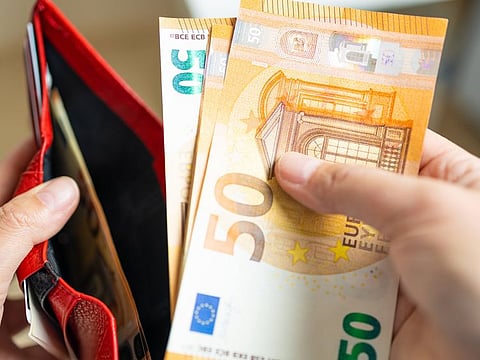Euro-zone inflation hits record high
Earlier this month ECB hiked interest rates by an unexpected 0.50% to tame inflation

Belgium: Euro-zone inflation climbed to another all-time high, supporting calls for the European Central Bank to follow up its first interest-rate hike since 2011 with another big move.
Consumer prices jumped 8.9 per cent from a year earlier in July - up from 8.6 per cent last month and driven once again by soaring energy and food costs. The number overshot the expectations of economists surveyed by Bloomberg, who saw a gain of 8.7 per cent.
After slowing in June, a gauge of underlying inflation that excludes energy and food also hit a record of 4 per cent.
The intensifying price pressures prompted the ECB to surprise economists by delivering a half-point increase in its deposit rate this month. President Christine Lagarde said at the time that it’s important to address any sign that inflation expectations are becoming entrenched.
Some companies are flourishing, despite the spike in prices, with luxury carmaker Mercedes-Benz, and shipping company Hapag-Lloyd reporting higher profits. Grappling with elevated natural gas costs, however, Uniper SE was bailed out last week by Germany’s government.
Speaking in an interview after July’s ECB meeting, Governing Council member Martins Kazaks urged a “quite significant” increase when officials next meet to set rates in September. That stance will have been bolstered by a second straight hike of 75 basis points this week by the Federal Reserve.
Beyond monetary policy, governments across the 19-nation currency bloc have weighed in with billions of euros in support to relieve households. Despite that, though, France and Spain notched inflation records again this month, separate data Friday showed.
Italian central bank chief Ignazio Visco says it’s too soon to decide the exact size of the next rate move. Recent shifts in the economic backdrop support that view, with the threat of a Russian energy cutoff bringing recession fears to the fore and prompting analysts and traders to scale back expectations for higher borrowing costs.
The headwinds in the region are, indeed, strengthening. Manufacturers are reporting a steepening downturn in demand, while higher prices are curbing service-sector activity, according to a recent survey by S&P Global.
JPMorgan and Goldman Sachs are among major banks that are predicting a recession, with Goldman saying it’s actually starting already this quarter. How that will affect inflation, though, remains unclear with energy - the No. 1 driver of prices so far - still the biggest unknown.






